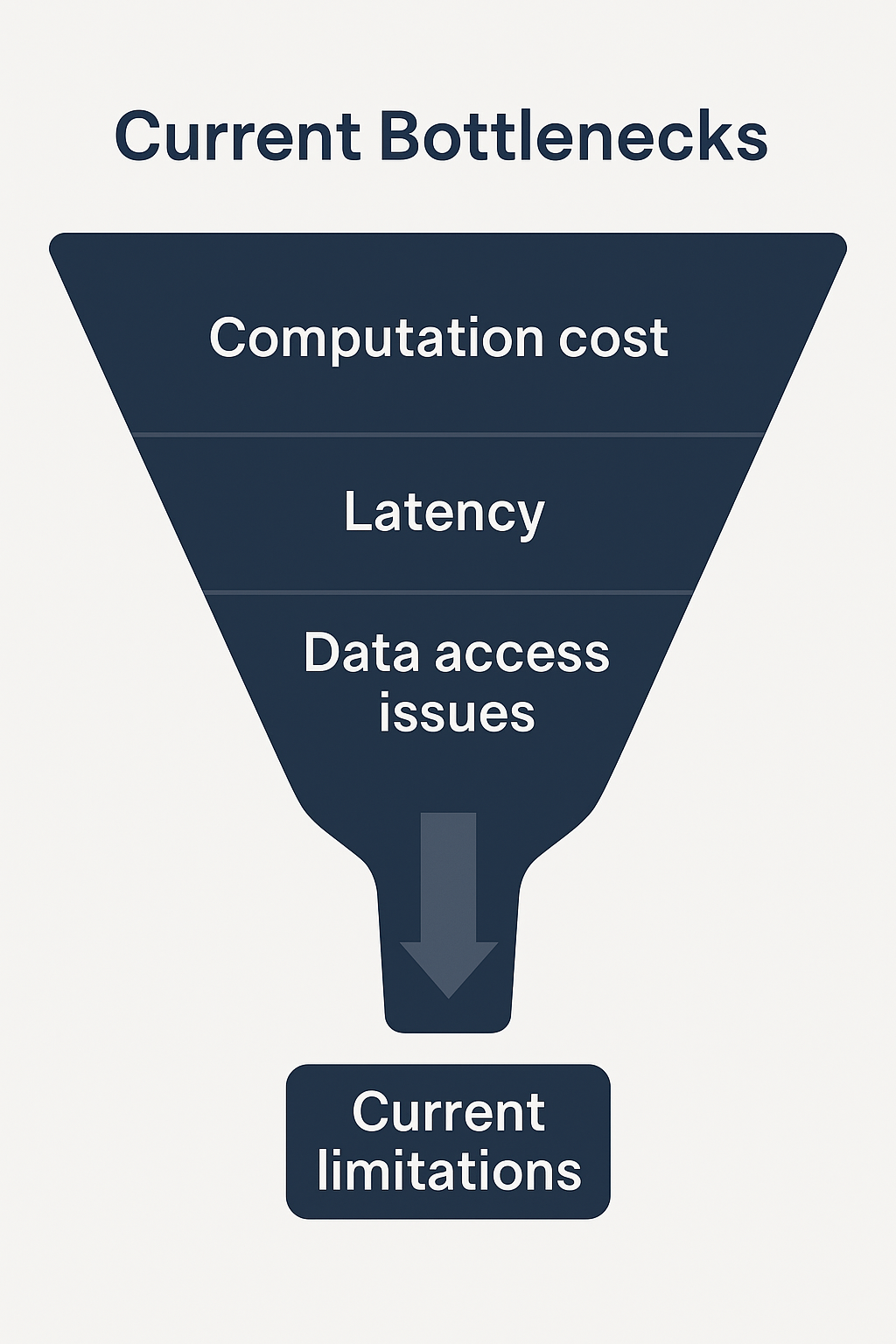Challenges and Future Outlook
Zero‑Knowledge Coprocessors (ZK Coprocessors) are still in the early stages of adoption, and while they offer significant promise, several technical and ecosystem‑level challenges remain unresolved. This module examines these barriers, the trends that indicate where the field is heading, and the opportunities that lie ahead for developers, investors, and researchers.
Current Bottlenecks

The most immediate challenge facing ZK Coprocessors is the cost and speed of proof generation. Despite significant progress in cryptographic research and hardware optimization, generating zero‑knowledge proofs for complex computations can still take minutes or even hours. This latency is incompatible with applications requiring near‑real‑time interaction, such as decentralized gaming or high‑frequency trading. Additionally, larger circuits increase memory requirements, which can be prohibitive for decentralized prover networks or devices with limited computational capacity.
Another bottleneck lies in data availability and access. Coprocessors often rely on historical blockchain data or off‑chain sources, and ensuring that this data is provably correct adds complexity. Systems must either use Merkle proofs, trusted data providers, or hybrid approaches that balance decentralization with practicality. Without robust solutions for data integrity, the value of zero‑knowledge proofs diminishes.
Adoption Barriers
Beyond technical hurdles, adoption is slowed by the steep learning curve for developers. Building applications with ZK Coprocessors requires knowledge of cryptography, circuit design, and zero‑knowledge programming languages like Circom or Noir. While platforms are working to abstract this complexity, the ecosystem still lacks standardized frameworks and comprehensive documentation. As a result, development remains concentrated among a small group of specialized teams.
Economic considerations also influence adoption. Proof generation, even when optimized, consumes significant computational resources. Many projects mitigate this by using centralized proving services, but this introduces trust assumptions that contradict the ethos of decentralized verification. The transition to decentralized proving networks will require incentives, coordination, and further research into efficient consensus mechanisms for proof generation.
Emerging Research Trends
Research into recursive proofs is one of the most promising avenues for overcoming scalability constraints. By nesting proofs inside one another, recursive systems can compress large computations into a single succinct proof, enabling more complex use cases without linear increases in verification cost. This technique also allows continuous or streaming computations to be verified incrementally, a critical requirement for real‑time applications.
Another emerging trend is the integration of machine learning and zero‑knowledge systems, often referred to as zkML. This approach enables verifiable AI inference, where outputs from machine learning models can be proven correct without revealing the model’s parameters or training data. As AI continues to intersect with blockchain, zkML‑enabled coprocessors may become central to privacy‑preserving AI‑driven applications.
Hardware acceleration is also advancing rapidly. FPGA and ASIC designs optimized for cryptographic primitives such as multi‑scalar multiplications and polynomial evaluations are reducing the time required to generate proofs. Companies building specialized ZK hardware are creating pathways for low‑latency, high‑throughput applications, particularly in finance and gaming.
Role in Modular Blockchain Ecosystem
The broader blockchain industry is moving toward modular architectures, where different components specialize in consensus, data availability, execution, and verification. ZK Coprocessors fit naturally into this model as specialized verification and computation engines. They can serve multiple chains simultaneously, acting as neutral hubs for cross‑chain data validation and complex off‑chain computation.
This modular approach allows ecosystems to evolve independently. A coprocessor built for verifiable data analytics can integrate with multiple rollups and application‑specific chains without requiring custom modifications. As rollups proliferate and interoperability becomes a critical need, coprocessors are well‑positioned to act as connective tissue across ecosystems.
Career and Builder Opportunities
For developers and researchers, the rise of ZK Coprocessors presents new career paths and funding opportunities. Demand for expertise in zero‑knowledge cryptography is growing rapidly, and grants from foundations such as the Ethereum Foundation, Polygon, and zkSync are actively funding research and development in this area. Hackathons focused on zero‑knowledge technology are becoming more common, offering a way for new entrants to gain experience and visibility.
Entrepreneurs can explore opportunities in building specialized coprocessor networks, middleware for data proofs, or developer tools that simplify the integration of zero‑knowledge computation into existing applications. Investors are closely watching this space, viewing ZK Coprocessors as a foundational layer for next‑generation decentralized finance, privacy‑preserving compliance, and cross‑chain communication.





